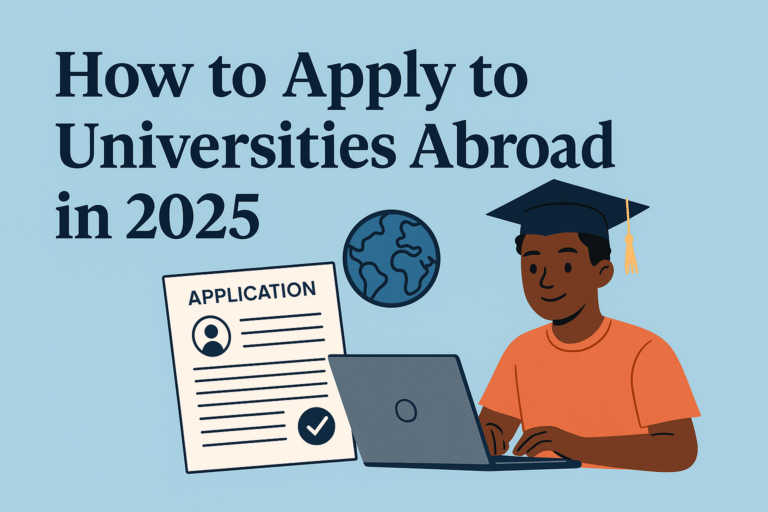Scholarships With No IELTS Requirement for 2025: Study Abroad Without English Tests
Let me guess, you’re dreaming of studying abroad but dreading the thought of taking the IELTS exam? You’re not alone! Many brilliant students feel anxious about standardized English tests, and some simply can’t afford the test fees or don’t have access to testing centers in their area.
Here’s the good news: you don’t always need IELTS to win scholarships and study abroad in 2025. Universities and scholarship providers worldwide are becoming more flexible with their English language requirements, recognizing that there are many ways to demonstrate language proficiency beyond traditional tests.
In this comprehensive guide, I’ll walk you through the best scholarships without IELTS requirements, alternative ways to prove your English skills, and strategies to maximize your chances of securing funding for your international education. Whether you’re eyeing undergraduate programs, master’s degrees, or PhD opportunities, there are scholarship options waiting for you.
Why Are Universities Moving Away from IELTS Requirements?
Before we dive into the scholarships, let’s understand why this shift is happening. Universities are recognizing that IELTS scores don’t always reflect a student’s true ability to succeed in an English-speaking academic environment. Many factors contribute to this change:
Financial Accessibility: IELTS tests can cost $200-300, which is a significant barrier for students from developing countries. Universities want to attract talented students regardless of their financial situation.
Geographic Accessibility: Not everyone has easy access to IELTS testing centers, especially students in remote areas or countries with limited testing infrastructure.
Alternative Assessment Methods: Modern technology allows universities to assess English proficiency through video interviews, writing samples, and online assessments that may be more practical and cost-effective.
Inclusive Education Goals: Many institutions are committed to creating more inclusive admission processes that don’t exclude qualified candidates based on standardized test performance alone.
Understanding Alternative English Proficiency Requirements
When universities waive IELTS requirements, they typically accept alternative proofs of English proficiency. Understanding these alternatives is crucial for your scholarship applications:
Previous Education in English: If you completed your high school or previous degree in English, many universities will accept this as proof of proficiency.
English as Native Language: Citizens of English-speaking countries (US, UK, Canada, Australia, New Zealand, Ireland) are usually exempt from language testing.
University-Specific Tests: Some institutions offer their own English proficiency assessments, often online and free of charge.
Medium of Instruction Certificates: Official letters from your previous schools confirming that your education was conducted in English.
Duolingo English Test: A more affordable and accessible alternative that’s gaining acceptance worldwide.
Cambridge English Qualifications: Some scholarships accept these as alternatives to IELTS.
Top Government Scholarships Without IELTS Requirements
1. Chinese Government Scholarships (CSC)
China offers some of the most generous scholarships for international students, and many don’t require IELTS for programs taught in Chinese or for students with English-medium education backgrounds.
Coverage: Full tuition, accommodation, living stipend, and medical insurance Eligibility: Open to students from developing countries Language Alternative: Previous education in English or passing the university’s English test Application Period: December to April annually Programs: Undergraduate, master’s, and PhD programs
The Chinese Government Scholarship is particularly attractive because it covers virtually all expenses, and many Chinese universities are rapidly climbing global rankings while offering programs in English.
2. Turkey Government Scholarships (Türkiye Scholarships)
Turkey’s scholarship program is one of the most comprehensive in the world, offering opportunities across all academic levels without strict IELTS requirements.
Coverage: Full tuition, monthly stipend, accommodation, health insurance, and flight tickets Eligibility: Open to students from all countries Language Alternative: English proficiency interview or certificate from previous English-medium education Application Period: January to February annually Programs: Undergraduate, master’s, PhD, and research programs
Turkey’s strategic location between Europe and Asia, combined with its rich cultural heritage and growing economy, makes it an attractive study destination.
3. Russian Government Scholarships
Russia offers numerous scholarship opportunities for international students, with many programs accepting alternative English proficiency proofs.
Coverage: Full tuition and monthly stipend Eligibility: Open to international students under 35 years old Language Alternative: Certificate of English-medium education or university entrance exam Application Period: February to April annually Programs: All academic levels and fields of study
Russian universities are particularly strong in STEM fields, medicine, and engineering, offering world-class education at no cost to scholarship recipients.
4. Hungarian Government Scholarships (Stipendium Hungaricum)
Hungary’s scholarship program offers excellent opportunities for studying in the heart of Europe without IELTS requirements.
Coverage: Full tuition, monthly stipend, accommodation, and health insurance Eligibility: Citizens of partner countries (check the official list) Language Alternative: English-medium education certificate or online English test Application Period: January to February annually Programs: Undergraduate, master’s, PhD, and non-degree programs
Hungary offers high-quality European education with the added benefit of EU mobility after graduation.
University-Specific Scholarships Without IELTS
1. University of Adelaide Global Citizens Scholarship (Australia)
Coverage: 15-30% tuition fee reduction Eligibility: International students with strong academic records Language Alternative: Previous study in English or alternative English tests Application: Automatic consideration with admission application Programs: Undergraduate and postgraduate programs
2. University of Manitoba Graduate Scholarships (Canada)
Coverage: $14,000-$18,000 annually Eligibility: International graduate students Language Alternative: English-medium degree or alternative proficiency proof Application: Through graduate program application Programs: Master’s and PhD programs
3. Radboud University Scholarship (Netherlands)
Coverage: Full tuition plus €11,000 living allowance Eligibility: Non-EU students with excellent academic records Language Alternative: English-taught bachelor’s degree or alternative assessment Application: February deadline annually Programs: Master’s programs
4. University of Twente Scholarships (Netherlands)
Coverage: €3,000-€25,000 towards tuition and living costs Eligibility: Non-EU students Language Alternative: Previous English-medium education or alternative tests Application: Multiple deadlines throughout the year Programs: Bachelor’s and master’s programs
Regional and Subject-Specific Scholarships
1. Islamic Development Bank Scholarships
Coverage: Full tuition, living allowance, and travel costs Eligibility: Students from IsDB member countries Language Alternative: English-medium education certificate Focus: STEM fields, medicine, and agriculture Application: Annual application cycle
2. INLAKS Scholarships (India to Global Universities)
Coverage: Up to $100,000 for studies abroad Eligibility: Indian citizens with exceptional academic records Language Alternative: English-medium education in India Application: October to December annually Programs: Master’s and PhD programs
3. GREAT Scholarships (UK Universities)
Coverage: £10,000 towards tuition fees Eligibility: Students from specific countries Language Alternative: Varies by university, many accept alternatives to IELTS Application: Through participating universities Programs: One-year master’s programs
4. Australia Awards Scholarships
Coverage: Full tuition, living allowance, and health insurance Eligibility: Citizens of eligible countries in Asia, Pacific, and Africa Language Alternative: English-medium education or alternative assessments Application: Country-specific application processes Programs: Undergraduate and postgraduate programs
Private and Organization Scholarships
1. Mastercard Foundation Scholars Program
Coverage: Full tuition, accommodation, and living expenses Eligibility: African students with leadership potential Language Alternative: English-medium education or alternative assessments Application: Through partner universities Programs: Undergraduate, master’s, and PhD programs
2. Aga Khan Foundation Scholarships
Coverage: 50% grant, 50% loan for tuition and living costs Eligibility: Students from developing countries Language Alternative: English proficiency interview Application: Annual application cycle Programs: Master’s and PhD programs
3. Joint Japan World Bank Graduate Scholarship
Coverage: Full tuition, monthly living allowance, and travel costs Eligibility: Citizens of World Bank member countries Language Alternative: English-medium degree or alternative proof Application: April annually Programs: Development-related master’s programs
Strategies for Finding More Scholarships Without IELTS
1. Research University Websites Directly
Don’t just rely on scholarship databases. Visit the websites of universities you’re interested in and look for their specific scholarship programs. Many institutions offer scholarships with flexible English requirements that aren’t widely advertised.
2. Contact International Student Offices
Reach out directly to international student offices at your target universities. They often have insider knowledge about upcoming scholarships or alternative pathways for students without IELTS.
3. Explore Country-Specific Programs
Many countries have bilateral education agreements that include scholarship programs with relaxed language requirements. Research agreements between your home country and potential study destinations.
4. Look for Subject-Specific Funding
Some scholarships are available for specific fields of study and may have more flexible language requirements, especially in STEM fields where technical knowledge is prioritized over language skills.
How to Strengthen Your Application Without IELTS
1. Demonstrate English Proficiency Creatively
Portfolio Method: Create a portfolio showcasing your English skills through academic papers, essays, or projects you’ve completed in English.
Video Submissions: Some scholarships accept video essays or presentations as proof of English communication skills.
Online Courses: Complete online courses taught in English and include certificates in your application.
Professional Experience: Highlight any work experience where you used English professionally.
2. Leverage Your Academic Background
English-Medium Education: If you studied in English at any level, make this prominent in your application and obtain official certificates.
Academic Achievements: Strong academic performance can sometimes compensate for lack of standardized test scores.
Research Experience: Any research conducted in English or published in English-language journals strengthens your profile.
3. Build a Strong Personal Statement
Your personal statement becomes even more critical when you don’t have IELTS scores. Use it to:
- Demonstrate your English writing skills
- Explain your English proficiency background
- Show your commitment to academic success
- Highlight relevant experiences and achievements
Alternative English Tests That Are Gaining Acceptance
1. Duolingo English Test
Cost: $49 (much cheaper than IELTS) Duration: 1 hour Availability: Online, available 24/7 Results: Available within 48 hours Acceptance: Growing rapidly among universities worldwide
2. Pearson Test of English (PTE)
Cost: $200-300 (similar to IELTS) Duration: 3 hours Availability: Computer-based, more flexible scheduling Results: Available within 2-5 business days Acceptance: Widely accepted, especially in Australia
3. Cambridge English Qualifications
Cost: Varies by test level Duration: Varies by qualification Availability: Multiple times per year Results: Available within 2-3 weeks Acceptance: Strong recognition, especially in Europe
Tips for Scholarship Applications Without IELTS
1. Start Early and Research Thoroughly
Begin your scholarship search at least a year before your intended start date. This gives you time to identify opportunities, prepare strong applications, and complete any alternative English assessments.
2. Prepare Multiple Forms of English Proficiency Proof
Don’t put all your eggs in one basket. Prepare multiple documents that demonstrate your English skills:
- Official transcripts showing English-medium education
- Certificates from English courses or programs
- Letters from teachers or employers confirming your English abilities
- Samples of academic or professional work in English
3. Focus on Your Strengths
Without IELTS scores, other aspects of your application become more important:
- Academic achievements and GPA
- Leadership experience and extracurricular activities
- Work experience and professional skills
- Community involvement and volunteer work
- Research experience and publications
4. Apply to Multiple Scholarships
Don’t limit yourself to one scholarship application. Apply to multiple programs to increase your chances of success. Many scholarships have similar requirements, so you can often reuse application materials.
5. Network and Seek Mentorship
Connect with current scholarship recipients or alumni who can provide insights into the application process. Join online communities and forums where scholarship applicants share experiences and advice.
Common Mistakes to Avoid
1. Assuming You Need IELTS for Every Scholarship
Many students automatically assume they need IELTS for any international scholarship. Always check the specific requirements for each program – you might be surprised by how many alternatives exist.
2. Not Highlighting English-Medium Education
If you studied in English at any level, make this clear in your applications. Many students forget to emphasize this crucial qualification.
3. Submitting Weak Personal Statements
Without IELTS scores, your personal statement becomes even more important for demonstrating English skills. Invest time in crafting a compelling, well-written statement.
4. Missing Application Deadlines
Some scholarships without IELTS requirements have earlier deadlines than traditional programs. Keep track of all deadlines and submit applications well in advance.
5. Not Following Instructions Carefully
Read application instructions thoroughly and follow them exactly. Scholarship committees often receive hundreds of applications, and failure to follow instructions can lead to automatic rejection.
Future Trends in Scholarship Requirements
The trend toward more flexible English language requirements is likely to continue in 2025 and beyond. Universities are increasingly recognizing that:
- Standardized tests don’t always predict academic success
- Financial barriers shouldn’t prevent talented students from applying
- Alternative assessment methods can be more practical and fair
- Diversity in student backgrounds enriches the academic environment
This shift creates more opportunities for students who might have been excluded from international education due to language testing requirements.
Your Next Steps to Scholarship Success
Now that you know about these amazing opportunities, here’s what you should do:
- Create a scholarship tracker with deadlines, requirements, and application status
- Gather your documents including transcripts, certificates, and proof of English-medium education
- Start writing your personal statements and essays early
- Research specific universities and their alternative English requirements
- Apply early and often to maximize your chances of success
Remember, not having IELTS scores doesn’t mean you can’t achieve your dream of studying abroad. With the right strategy, preparation, and persistence, you can secure scholarship funding and embark on your international education journey.
Conclusion: Your Scholarship Journey Starts Now
The landscape of international education is changing, and it’s changing in your favor. More opportunities than ever exist for students to study abroad without the traditional barriers of expensive English tests.
Whether you’re interested in fully-funded government scholarships, prestigious university awards, or specialized program funding, there are options available that match your academic goals and financial needs. The key is to start early, research thoroughly, and present yourself as the capable, motivated student you are.
Your English skills are probably better than you think, and there are multiple ways to demonstrate them beyond IELTS. Don’t let fear of language tests hold you back from pursuing your dreams of international education.
The world is waiting for talented students like you. Start your scholarship applications today, and take the first step toward your global education adventure. Your future self will thank you for having the courage to pursue these opportunities, and who knows? You might be the next success story inspiring other students to follow their dreams.
Good luck with your applications, I’m confident you have what it takes to succeed!







